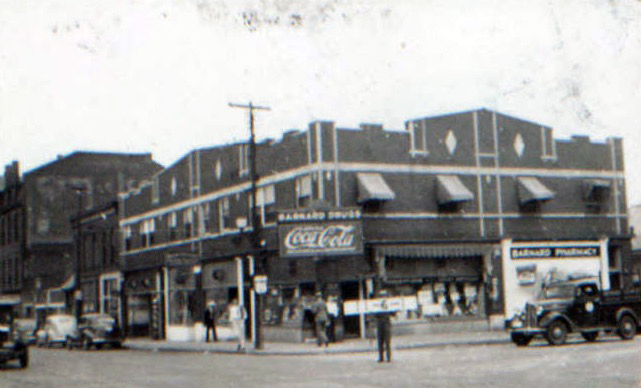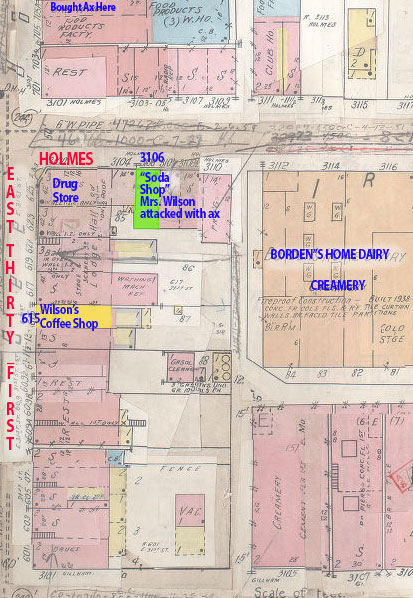
In 1929, Mrs. Maud Wilson, the wife of the proprietor of a coffee shop at 31st and Holmes, was catapulted to the front page of the newspapers, where she held a firm spot for several weeks.
By all accounts, the hard-working women struggling with her husband and daughter, Iris, to earn a living at the coffee shop, Maud apparently went over the edge and took an ax to the “soft drink” establishment just around the corner at 3106 Holmes.

She told the Kansas City Star her daughter had gone to the soda shop and been given alcohol, which was not legal since the country was at that time in the middle of Prohibition.
And then her husband, who had not touched a drop of liquor in almost a decade, had himself been drawn into “the dark web of the ‘soft drink’ place. He came home drunk and the following day was still in bed, recovering from the ill effects of the liquor.
So Maud marched to Marvin Hardware at 707 East Thirty-first and bought an ax. And with the ax, she smashed, Carrie-Nation-style, the windows, mirrors, and glasses of the “soft drink” establishment at 3106 Holmes and confiscated a half-full bottle of what she believed was corn liquor.
Then she went back around the corner to the coffee shop to work.
When asked why she took matters into her own hands rather than calling the police, Mrs. Wilson said she had seen policemen go into the soft drink establishment. The owner, Jiggs Shindel of 3340 Troost, boasted of his ties to city officials who would protect him from prosecution.

Many Rally around Maud Wilson in Support of Prohibition
Maud Wilson struck a nerve with Kansas Citians who felt Prohibition was not really going as they thought it should here.
An associate pastor from the nearby Tabernacle Baptist Church at 900 East Twenty-ninth Street applauded her actions, saying in a front-page letter to the Star, “Kansas City police are not only negligent in enforcing prohibition laws but actually assist bootleggers in rum-running.” He added that police officers frequented a pharmacy at the corner of Linwood and Holmes operated by a bootlegger, leaving their motorcycles parked outside for hours.
The coverage prompted W. Harold Lane, head of federal government prohibition in Kansas City, to say, “I wish there were a hundred Mrs. Wilsons. My department would be better off. The city of Kansas City needed something like that to wake it up.
“There are more fake front saloons operating in Kansas City now than there were legitimate bars before prohibition,” Mr. Lane said. “Everyone who looks about can guess it. Everyone has known there are dozens, scores, hundreds of booze peddling joints.”
“The only ones who don’t know it, apparently, are the police,” Mr. Lane said. “I expect there are a thousand places, counting apartment houses and private residences, selling booze to trade in the city right now.”
Lane added that a standard scheme was a “blind pig” set up as a soft drink shop or restaurant with a few tables – never occupied – in the front window. Behind them, hidden by a partition, whiskey drinking thrived. “Drug stores” with a handful of actual medical supplies on hand were also known fronts for the liquor trade. However, while the police had made 3000 liquor arrests that year, no more than ten people had been fined or jailed.
The governor and even the U.S. Prohibition Department were called upon to intervene.
Mrs. Wilson was being celebrated by business people honoring her for her excellent work. But the same day, her now-famous husband made his own headlines when he went down by the Union Station where “the liquor was flowing,” got drunk, and couldn’t account for the $60 he’d had when he started his night out.
The Bootleggers Fight Back
Under the scrutiny of the media and federal authorities, the county prosecutor’s office ordered all three Wilsons—Maud, William, and Iris—to appear before a grand jury investigating liquor violations. Maud was instructed to produce the bottle she had taken from 3106 Holmes, which tests proved did indeed contain alcohol.
Before they testified, however, someone threw a brick through the window of the Wilson Coffee Shop, a warning that the bootleggers would not go down without a fight.
The newspaper also reported three hundred policemen were out “to clean up the joints,” and liquor sellers were adding more “props” in the way of legitimate merchandise in their storefronts.
Inspired by Mrs. Wilson’s ax swinging, women began showing up at the police station, offering to help. The police discouraged them from taking up axes, but it was soon revealed that five “young, attractive, and smartly dressed” women, several from socially prominent families, had been assisting Sgt. Elmer Duncan, head of police raiding squads. They accompanied plain-clothed police officers to speakeasies and were instrumental in several convictions.
Maud Wilson didn’t stop drinking, but she managed to shake things up for a good while, especially on her Midtown block.
“Several drug store liquor places in the neighborhood of Mrs. Wilson’s café near Thirty-first and Holmes streets dried up like the desert after the raids and investigations.” the Star reported three months later.
Pingback: Do you remember this block from 31st to Linwood, Gillham to Holmes? | Midtown KC Post
Pingback: Do you remember this block from 31st to Linwood, Gillham to Holmes? - Midtown KC Post